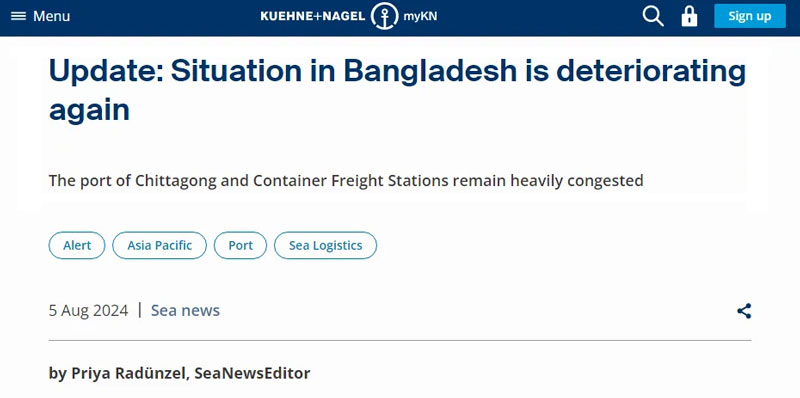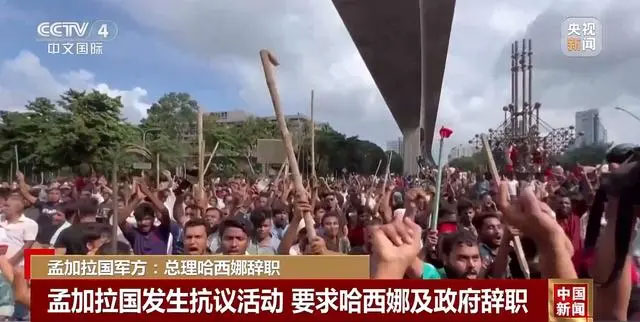

More than 40,000 containers were stranded in port and ships were forced to wait for more than a week in the Bay of Bengal
Nationwide protests against the government's reinstated quota system for civil servants in Bangladesh have worsened again after more than a month, with demonstrations intensifying.
The move came after the government imposed a curfew, cut off mobile and Internet services, closed schools and mobilised the army to try to quell the growing unrest. However, these measures do not appear to have been effective in curbing the spread of protests and the escalation of violence, and have instead provoked more aggressive protests.
After weeks of protests, curfews and Internet outages, about 50 ships are lined up outside Chittagong for berthing operations and 44,117 TEU of cargo is piled up in the port yard. Bangladesh's supply chain is being thrown into turmoil by growing civil unrest, with factories closed for two days and exports all but halted. Customs procedures have been all but suspended due to disruptions in the movement of goods through seaports and airports.
Chittagong, which handles more than 90 per cent of Bangladesh's international trade, now has the world's worst berthing delays, with many ships forced to wait more than a week in the Bay of Bengal, according to analysts at Linerlytica, an Asian container shipping consultancy that tracks global congestion.
The plant will remain closed until further orders are given. From the warehouse in Chittagong, only a few hundred boxes can be shipped to the port for shipment. On Monday morning, the freight process was affected as Internet connections were down for several hours.
Not only sea freight, but the Bangladesh air cargo market faces delays and extremely high freight rates.
Ruhul Amin Sikder Biplob, secretary general of the Bangladesh Inland Container Yards Association, noted: "On Monday night, we suspended the delivery of boxes to the port due to security concerns." He further revealed that due to the nationwide violence, the port yard has received a very small number of trucks since the 5th and 6th, which has seriously affected logistics efficiency.
The port of Chittagong is severely congested. According to seaexplorer, the waiting time for ships is still 3-4 days, but the number of ships waiting at the anchorage has increased to 11.
Chittagong Port Authority spokesman Omar Faruk said that as of the morning of the 6th, the port terminal had completed the delivery of only 329 TEUs, far below the normal daily delivery of more than 4,000 TEUs. He predicted that deliveries throughout the day of the 6th May increase to about 1,000 TEUs, but still far below normal levels.
Kuehnl issued a warning, saying that "the Bangladesh government has imposed a curfew from 6 p.m. on August 4 until further notice." In addition, Monday to Wednesday (August 5-7) has been declared a national holiday, and all offices will remain closed. Mobile Internet services have been disrupted, only broadband is available, and connections are patchy."
According to the latest news, the female Prime minister of Bangladesh Hasina resigned on the 5th, and left for India with her family in protest. In a televised address, army chief Waek Uzi Zaman said an interim government would soon be formed to run the country. On the 6th, the office of the President of Bangladesh issued a statement saying that Bangladeshi President Chupu announced the dissolution of the National Assembly on the same day.
There are reports that the current situation in the country appears to be easing after Prime Minister Sheikh Hasina resigned and left the country yesterday. The protests have had a significant impact on Bangladesh's economy, with the Bangladesh Chamber of Foreign Investors and Industry previously estimating that the wave of protests has caused more than $10 billion in economic losses to Bangladesh, and international agencies have also downgraded Bangladesh's credit rating, which will affect investor confidence. But if Bangladesh's political stability can be restored, so should its economy, which still has the advantages of abundant labor and improved infrastructure.
Indian Railways had previously announced the suspension of all cross-border train operations between India and Bangladesh from July 19 to August 6. After Hasina's resignation, the Indian railway department announced that all train operations between India and Bangladesh would also be suspended six days later. In addition, the Indian Border Security Force said on the 5th that it has asked the India-Bangladesh border Force to be "on high alert".
Sungreen Logistics reminds that due to the severe situation in Bangladesh and the long duration cycle, friends who have shipped to the country in the near future, pay attention to risk control, pay close attention to the delay and impact of goods, so as not to bring unnecessary losses!

Photo Source: Shipping network intrusion
The move came after the government imposed a curfew, cut off mobile and Internet services, closed schools and mobilised the army to try to quell the growing unrest. However, these measures do not appear to have been effective in curbing the spread of protests and the escalation of violence, and have instead provoked more aggressive protests.
After weeks of protests, curfews and Internet outages, about 50 ships are lined up outside Chittagong for berthing operations and 44,117 TEU of cargo is piled up in the port yard. Bangladesh's supply chain is being thrown into turmoil by growing civil unrest, with factories closed for two days and exports all but halted. Customs procedures have been all but suspended due to disruptions in the movement of goods through seaports and airports.
Chittagong, which handles more than 90 per cent of Bangladesh's international trade, now has the world's worst berthing delays, with many ships forced to wait more than a week in the Bay of Bengal, according to analysts at Linerlytica, an Asian container shipping consultancy that tracks global congestion.
The plant will remain closed until further orders are given. From the warehouse in Chittagong, only a few hundred boxes can be shipped to the port for shipment. On Monday morning, the freight process was affected as Internet connections were down for several hours.
Not only sea freight, but the Bangladesh air cargo market faces delays and extremely high freight rates.
Ruhul Amin Sikder Biplob, secretary general of the Bangladesh Inland Container Yards Association, noted: "On Monday night, we suspended the delivery of boxes to the port due to security concerns." He further revealed that due to the nationwide violence, the port yard has received a very small number of trucks since the 5th and 6th, which has seriously affected logistics efficiency.
The port of Chittagong is severely congested. According to seaexplorer, the waiting time for ships is still 3-4 days, but the number of ships waiting at the anchorage has increased to 11.
Chittagong Port Authority spokesman Omar Faruk said that as of the morning of the 6th, the port terminal had completed the delivery of only 329 TEUs, far below the normal daily delivery of more than 4,000 TEUs. He predicted that deliveries throughout the day of the 6th May increase to about 1,000 TEUs, but still far below normal levels.
Kuehnl issued a warning, saying that "the Bangladesh government has imposed a curfew from 6 p.m. on August 4 until further notice." In addition, Monday to Wednesday (August 5-7) has been declared a national holiday, and all offices will remain closed. Mobile Internet services have been disrupted, only broadband is available, and connections are patchy."

Photo source: Kuehne & Nagel official website censored
According to the latest news, the female Prime minister of Bangladesh Hasina resigned on the 5th, and left for India with her family in protest. In a televised address, army chief Waek Uzi Zaman said an interim government would soon be formed to run the country. On the 6th, the office of the President of Bangladesh issued a statement saying that Bangladeshi President Chupu announced the dissolution of the National Assembly on the same day.

Photo source: CCTV News censored
There are reports that the current situation in the country appears to be easing after Prime Minister Sheikh Hasina resigned and left the country yesterday. The protests have had a significant impact on Bangladesh's economy, with the Bangladesh Chamber of Foreign Investors and Industry previously estimating that the wave of protests has caused more than $10 billion in economic losses to Bangladesh, and international agencies have also downgraded Bangladesh's credit rating, which will affect investor confidence. But if Bangladesh's political stability can be restored, so should its economy, which still has the advantages of abundant labor and improved infrastructure.
Indian Railways had previously announced the suspension of all cross-border train operations between India and Bangladesh from July 19 to August 6. After Hasina's resignation, the Indian railway department announced that all train operations between India and Bangladesh would also be suspended six days later. In addition, the Indian Border Security Force said on the 5th that it has asked the India-Bangladesh border Force to be "on high alert".
Sungreen Logistics reminds that due to the severe situation in Bangladesh and the long duration cycle, friends who have shipped to the country in the near future, pay attention to risk control, pay close attention to the delay and impact of goods, so as not to bring unnecessary losses!





